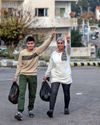
Because if one thing was certain about this concert, it's that it won't be over for a long, long time yet.
Playing nonstop since September 2001, the performance of John Cage's composition Organ²/ASLSP As Slow As Possible in a town at the feet of the Harz mountains is one of the longest-running concerts in the world. Scheduled to last for 639 years, it isn't due to finish until 2640. (The only musical performance that is forecast to last longer, Jem Finer's Longplayer piece for singing bowls inside the lighthouse at Trinity Buoy Wharf, London, is scheduled to wind up in 2999.)
At 3pm last Monday, the concert reached its latest milestone. One of the volunteers who keep the project going plugged an additional pipe into the organ, adding a D to the chord. It was the first chord change in two years, the 16th since its start more than two decades ago.
About 150 guests from across Germany, the US, Russia, China and the Philippines paid €200 ($215) for a frontrow seat. As is customary, the change in sound was followed by a five-minute silence and a round of applause.
هذه القصة مأخوذة من طبعة February 16, 2024 من The Guardian Weekly.
ابدأ النسخة التجريبية المجانية من Magzter GOLD لمدة 7 أيام للوصول إلى آلاف القصص المتميزة المنسقة وأكثر من 9,000 مجلة وصحيفة.
بالفعل مشترك ? تسجيل الدخول
هذه القصة مأخوذة من طبعة February 16, 2024 من The Guardian Weekly.
ابدأ النسخة التجريبية المجانية من Magzter GOLD لمدة 7 أيام للوصول إلى آلاف القصص المتميزة المنسقة وأكثر من 9,000 مجلة وصحيفة.
بالفعل مشترك? تسجيل الدخول

'It's really a disaster' The fight to save lives as gang war consumes capital
Dr James Gana stepped out on to the balcony of his hospital overlooking a city under siege. \"There's a sensation of 'What's next?'. Desperation is definitely present,\" the Médecins Sans Frontières (MSF) medic said, as he stared down at one of scores of camps for displaced Haitians in their country's violence-plagued capital.

Trailblazers The inspiring people we met around the world this year
From an exuberant mountaineer to a woman defiantly facing the guns of war, here are some of the brave individuals who gave us hope in a tumultuous 2024

Votes of confidence
From India to Venezuela and Senegal to the US, more people voted this year than ever before, with over 80 elections across the world. With rising authoritarianism and citizen-led resistance revealing its vulnerabilities and resilience in the face of unprecedented challenges, has democracy reached its breaking or turning point?

Out of touch How president sealed his own fate in martial law gambit
For Yoon Suk Yeol, this month's short-lived martial law declaration wasn't just a catastrophic miscalculation - it was the culmination of a presidency that had been troubled from the start.

Son of the soil Who is François Bayrou, the farmer turned prime minister?
François Bayrou, the new French prime minister, calls himself a country man. A tractor-driving \"son of the soil\" and breeder of thoroughbreds, he has run for president three times, saying his rural roots and centrist politics led him to try to find common ground between left and right.

Power plant workers keeping the lights on
The Guardian Weekly visits a Soviet-era coal-fired thermal installation to learn how it has held up to Russian attacks

Prince charmed Alleged spy scandal may have exposed China threat
Prince Andrew should be commended for doing Britain a great service, according to longstanding China watcher Charles Parton. The now marginalised royal has, the analyst observed, \"almost single handedly\" succeeded \"in highlighting the threat to free and open countries\" posed by the contemporary Chinese state.

In Moscow, a new life of secluded irrelevance awaits Assad
He was whisked away without a last message to his people, the aircraft's transponder deliberately switched off to avoid detection as it departed from an airbase in Syria.

'We fear new oppression' Alawites worry over rebel rule
To prepare khubeiza, the leaves of the kale-like plant must be roughly chopped and sauteed with onions, garlic and a dash of salt. According to folklore, the recipe originated among the Alawite communities who lived in Syria's mountainous coastline where the fibrous, wild-growing plant can be found in abundance. So poor were the Alawites in Ottoman times, the story goes, that the only food they could find to eat was khubeiza, which sprouts like a stubborn weed every spring.

'Gisèle is waiting for explanations'
The Pelicot rape trial has horrified the world. But as it comes to an end, the questions it has raised about French society and rape culture have still not been answered.